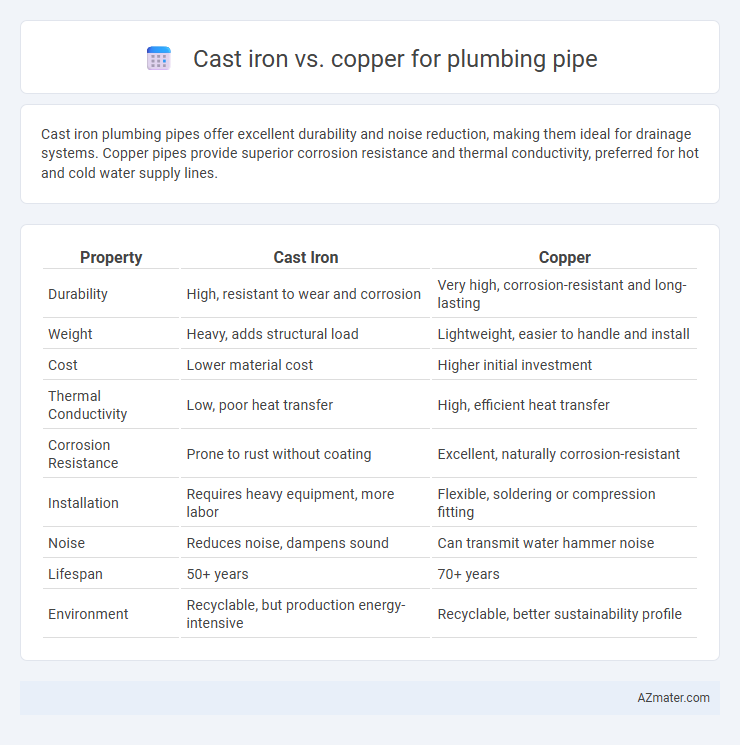Cast iron plumbing pipes offer excellent durability and noise reduction, making them ideal for drainage systems. Copper pipes provide superior corrosion resistance and thermal conductivity, preferred for hot and cold water supply lines.
Table of Comparison
| Property | Cast Iron | Copper |
|---|---|---|
| Durability | High, resistant to wear and corrosion | Very high, corrosion-resistant and long-lasting |
| Weight | Heavy, adds structural load | Lightweight, easier to handle and install |
| Cost | Lower material cost | Higher initial investment |
| Thermal Conductivity | Low, poor heat transfer | High, efficient heat transfer |
| Corrosion Resistance | Prone to rust without coating | Excellent, naturally corrosion-resistant |
| Installation | Requires heavy equipment, more labor | Flexible, soldering or compression fitting |
| Noise | Reduces noise, dampens sound | Can transmit water hammer noise |
| Lifespan | 50+ years | 70+ years |
| Environment | Recyclable, but production energy-intensive | Recyclable, better sustainability profile |
Introduction to Cast Iron and Copper Plumbing Pipes
Cast iron plumbing pipes are known for their durability, sound-dampening properties, and resistance to corrosion, making them ideal for waste and drainage systems in residential and commercial buildings. Copper pipes offer superior thermal conductivity, corrosion resistance, and biostatic properties, frequently used for water supply lines and heating systems due to their reliability and longevity. Both materials provide distinct advantages depending on the application, with cast iron excelling in heavy-duty drainage and copper favored for potable water distribution.
Historical Use of Cast Iron and Copper in Plumbing
Cast iron has been historically favored in plumbing for its durability and resistance to high pressure, commonly used in drainage systems since the 19th century, while copper gained prominence in the mid-20th century due to its corrosion resistance and ease of installation. Cast iron pipes were integral in early urban infrastructure, supporting water and waste transport in large-scale municipal projects. Copper's rise followed advances in metallurgy and the demand for antimicrobial properties, making it a preferred material for residential water supply lines.
Comparative Durability and Longevity
Cast iron plumbing pipes offer exceptional durability with a lifespan of 50 to 100 years, resisting corrosion and physical damage better in high-pressure applications. Copper pipes provide excellent longevity as well, typically lasting 70 to 80 years, with superior resistance to corrosion in various water conditions and the benefit of being less noisy under water flow. Both materials perform well, but cast iron excels in heavy-duty, structural durability, while copper is favored for its corrosion resistance and ease of installation.
Corrosion Resistance: Cast Iron vs Copper
Cast iron pipes exhibit strong resistance to external corrosion due to their protective iron oxide layer but are prone to internal rusting, which can reduce water flow over time. Copper pipes inherently resist corrosion from most water types, forming a protective patina that enhances longevity and maintains water quality. In plumbing applications demanding durability and corrosion resistance, copper outperforms cast iron, especially in environments with varying pH levels or aggressive water chemistry.
Installation Process and Ease
Cast iron plumbing pipes require specialized tools and skilled labor for cutting, joining, and fitting, often involving heavy, cumbersome materials that slow installation. Copper pipes offer greater ease of installation due to their lighter weight and the availability of various connection methods such as soldering, crimping, and push-fit systems, reducing labor time and costs. The flexibility and corrosion resistance of copper also simplify adjustments during installation, making it a preferred choice for quicker and more efficient plumbing projects.
Cost Analysis: Upfront and Long-Term
Cast iron plumbing pipes have a higher upfront cost compared to copper but offer superior durability, resulting in lower maintenance expenses over time. Copper pipes, while initially less expensive, are prone to corrosion and may require more frequent repairs or replacements, increasing long-term costs. Evaluating the total cost of ownership, cast iron provides better value in commercial or large-scale plumbing projects where longevity is critical.
Environmental Impact and Sustainability
Cast iron plumbing pipes offer superior durability and can be recycled at the end of their long lifespan, reducing environmental waste and supporting sustainability goals. Copper pipes, while also recyclable, require significant energy for mining and refining, resulting in higher carbon emissions compared to cast iron. Both materials provide sustainable options, but cast iron's longevity and recyclability make it a more environmentally favorable choice for plumbing systems.
Maintenance Requirements and Repair
Cast iron plumbing pipes demand regular inspection and maintenance due to their susceptibility to rust and corrosion, requiring periodic cleaning and sealing to prevent leaks and blockages. Copper pipes offer easier maintenance with higher resistance to corrosion but need occasional checks for pinhole leaks and proper joint soldering to avoid water damage. Repairing cast iron typically involves segment replacement or sealing with specialized compounds, whereas copper pipe repairs often consist of soldering or using compression fittings for quicker, less invasive fixes.
Common Applications in Residential and Commercial Buildings
Cast iron plumbing pipes offer excellent durability and sound insulation, making them ideal for residential waste and drainage systems, especially in multi-story buildings due to their resistance to corrosion and fire. Copper pipes are widely used in both residential and commercial plumbing for water supply because of their superior thermal conductivity, corrosion resistance, and ease of installation. In commercial applications, copper facilitates complex piping systems requiring high pressure and temperature tolerance, while cast iron remains preferred for heavy-duty drainage and venting.
Which Plumbing Pipe Material Is Best for You?
Cast iron pipes offer durability, excellent noise reduction, and resistance to corrosion, making them ideal for drainage and vent systems in residential plumbing. Copper pipes provide superior reliability for both hot and cold water supply due to their corrosion resistance, antimicrobial properties, and ability to withstand high temperatures. Choosing between cast iron and copper depends on factors such as budget, installation environment, maintenance preferences, and specific plumbing requirements.

Infographic: Cast iron vs Copper for Plumbing Pipe
 azmater.com
azmater.com